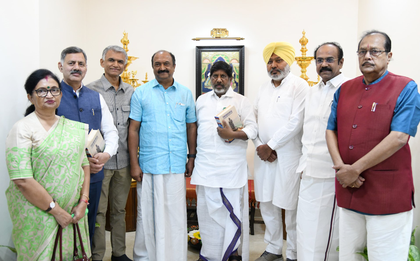Telangana DyCM flags revenue loss concern at GST Council meet
By IANS | Updated: September 3, 2025 22:15 IST2025-09-03T22:13:03+5:302025-09-03T22:15:17+5:30
Hyderabad, Sep 3 Telangana’s Deputy Chief Minister and Finance Minister Mallu Bhatti Vikramarka told the Goods and Services ...

Telangana DyCM flags revenue loss concern at GST Council meet
Hyderabad, Sep 3 Telangana’s Deputy Chief Minister and Finance Minister Mallu Bhatti Vikramarka told the Goods and Services Tax (GST) Council on Wednesday that any reduction in the revenues of the states on account of proposed GST rate rationalisation will have a direct impact on essential services like health and education and welfare schemes.
He also stated that this will have an effect on the common man and the middle class. Further, the non-availability of funds for infrastructure projects will have a drastic impact on the development of the states.
Vikramarka flagged the state’s concern over possible revenue loss during the 56th meeting of the GST Council, chaired by Union Finance Minister Nirmala Sitaraman in New Delhi on Wednesday.
Stating the present proposals, if implemented without compensation, will cause severe damage to state revenues and widen fiscal imbalances, he told the Council that it is the considered recommendation of the state that rate rationalisation should be supported by a robust revenue protection framework, a supplementary levy on sin and luxury goods, and a guaranteed compensation mechanism for at least five years. Only such a balanced approach will protect the fiscal autonomy of states while advancing the objectives of GST reform in the true spirit of cooperative federalism, he said.
According to an official release here, the Deputy CM put forward the state’s perspective on the impact of rate rationalisation and the concerns of states. He informed the Council that expenditure on salaries, pensions and debt repayment is more than 50 per cent of the revenues. There is no flexibility or freedom for the states in this regard.
He stated that prior to GST, the states had the flexibility to plan and raise the revenues to cater to the needs of the states. Now, states don’t have such fiscal manoeuvrability in raising revenues, whereas expenditure is the responsibility of the states. The GST Council is therefore endowed with the responsibility to safeguard and protect the revenues of the states. The proposal of the Union government on GST will have a large impact on the revenue to the states, he said.
Vikramarka said that Telangana, while welcoming rate rationalisation, would like to propose that the measures to safeguard the states' revenues should be done in parallel.
He proposed that rationalisation should be supported by a robust revenue protection framework. States’ revenue loss must be fully compensated through a mechanism similar to the GST Compensation Cess. An additional levy on sin and luxury goods should be imposed in order to maintain the current effective level of taxation. These proceeds must be fully transferred to the states, which are already experiencing rising fiscal stress alongside an erosion of fiscal autonomy.
He said the Centre should raise loans to compensate the balance revenue loss of states (both due to rate rationalisation and loss of compensation cess) and repay the same through extension of the compensation cess beyond 5 years, as per the past precedence.
Vikramarka said the base year for compensation should be FY 2024–25. The state revenue for the year 2024-25 should comprise the GST revenues of the state and the compensation cess due to the state based on the place of supply. Protection should be granted at the rate of 14 per cent per annum, which is also the average of the growth rates of the preceding three financial years. Compensation should be assured for a minimum of five years, beyond which it may be reviewed based on GST buoyancy, he suggested.
The Deputy Chief Minister stated that the Goods and Services Tax is a shared fiscal framework between the Centre and the states, built on the principle of consensus and cooperative federalism. Simplification and rationalisation of rates are desirable objectives, but they should not be pursued at the expense of the fiscal stability of states, he added.
Disclaimer: This post has been auto-published from an agency feed without any modifications to the text and has not been reviewed by an editor
Open in app